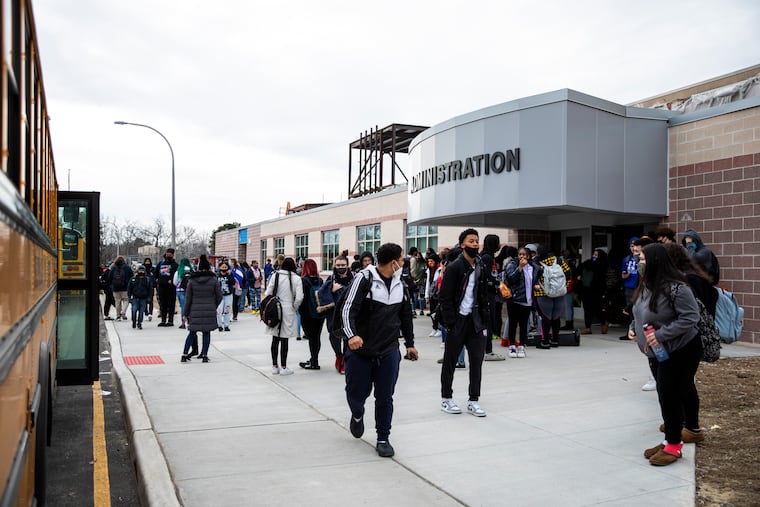Plan to replace N.J. school-based mental health programs with regional hubs comes under attack from districts
New Jersey has school-based youth service programs in nearly 90 schools. A plan that's been receiving pushback would switch to a regional approach to reach 2,400 schools.

For 17 years, Millville High School students have visited the LINK, a one-stop shop to receive mental health counseling and health services — or simply to hang out with friends away from the hustle and bustle of the school day.
Located in a special wing of the school, the program offers easy access to more than 1,600 ninth through 12th graders and reduces the stigma often associated with mental health issues, said Superintendent Tony Trongone. He said it’s a desperately needed safe haven in the Cumberland County school system.
“There’s a lot to this program,” Trongone said in an interview.
» READ MORE: Young people are in mental health crisis and New Jersey needs a plan to help | Opinion
The program at Millville High is among 86 school-based youth services (SBYS) programs around the state that school officials and lawmakers are now debating: The state wants to expand services by pulling them out of schools and into regional hubs. School officials say it’s poorly timed to remove conveniently located services from students already using them.
New Jersey, like other states, has declared youth mental health a crisis, especially since the pandemic. A recent Rutgers-Eagleton poll found that 340,000 families reported that their school-aged children experienced prolonged bouts of poor or fair mental health, said Department of Children and Families Commissioner Christine Beyer.
“It’s clear that youth mental health is a public health emergency,” she said.
The current program annually serves 25,000 to 30,000 of New Jersey’s 1.4 million students and costs about $32 million, according to the state. But there are about 2,400 schools in New Jersey that don’t have school-based youth services in their buildings, Beyer said.
In a concept paper outlining the need to expand services, the state said it would create regional hubs throughout the New Jersey Statewide Student Support Services network, or NJ4S, near the state’s 15 court districts by June 30, 2023. There would be a “hub and spoke” model staffed with prevention specialists and mental health counselors.
» READ MORE: Youth mental health is in crisis. Are schools doing enough?
During a legislative hearing last week in Trenton by the Joint Committee on Public Schools on the proposal, Beyer said the location of the centers would be determined after working with local officials. The state has said the center staff would provide mental health services to schools, community centers, faith-based groups, and even individual homes.
“Not every youth wants to access services in schools,” Beyer said. “They should have the option to access services where they feel most comfortable and physically and emotionally safe.”
Trongone and other school officials say the school-based youth services program, which was started in 1988, has been effective and they want to make sure the services remain in their schools. They testified at the hearing that the state should simply expand the program to other schools, not dismantle the current locations.
Besides mental health services, the programs provide health and wellness services for students and their families, help with substance-abuse problems, job-search initiatives, and recreation offerings. School officials say students can get help in real time with an intervention that would likely allow them to remain in school. Some services are not readily available in economically depressed rural areas like Millville, Trongone said.
“It just doesn’t make sense to me,” Trongone said. “Kids’ lives are at stake.”
» READ MORE: When mental health crises require more than a phone conversation, these mobile units come to help
Beyer said the state cannot afford to fund the program in every New Jersey school in addition to the 63 districts currently with school-based services. Besides Millville and Camden, other South Jersey schools that offer the programming include Willingboro High School, Pemberton Township High School, Clayton Middle School, Gloucester County Institute of Technology in Deptford, Bridgeton High School, and Penns Grove High School.
There was pushback against the proposed change from lawmakers on both sides of the aisle during the two-hour hearing, with some saying they would not support ending school-based youth services. Sol Heckelman, past president of the New Jersey Association of School Psychologists, said providing access in school was the “most efficient and productive” approach.
“They’re saving lives. They’re working,” said State Sen. Renee C. Burgess (D., Essex). “Why change it?”
Added Assemblywoman Angela V. McKnight (D., Hudson): “This is no for me.”
Trenton School Superintendent James Earle told the committee that his district could not afford to replicate the program. Trenton and Ewing are the only districts in Mercer County with school-based programs.
“Our need is great,” Earle said.
Camden School Superintendent Katrina T. McCombs called the proposal to change mental health services “ill-timed” when so many kids are suffering from increased depression, stress, and anxiety due to the pandemic. Of the district’s 19 schools, it has school-based youth services programs in six buildings, including its two comprehensive high schools.
“We already had high trauma in our district,” McCombs said. “It’s tone deaf to where we are as an education system trying to recover.”
The Department of Children and Families said it would release a request for proposals and solicit bids from contractors to staff and run the 15 regional hubs, according to the concept paper.
Said Assemblywoman Mila Jasey (D., Essex), a Joint Committee member: “Be assured that this is not an issue that we’re going to let go of.”